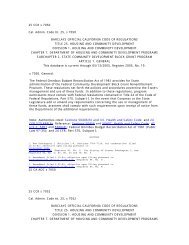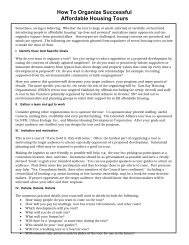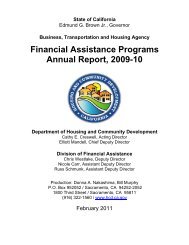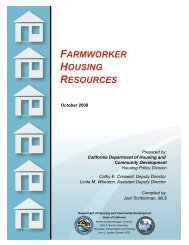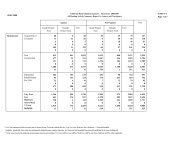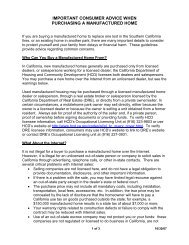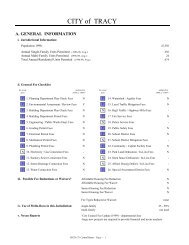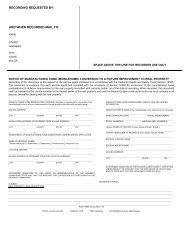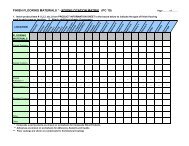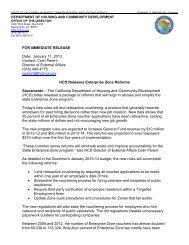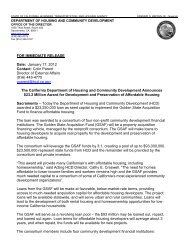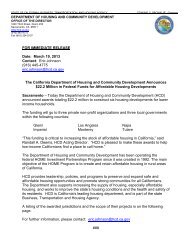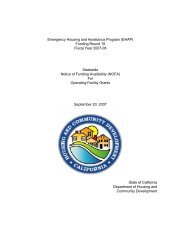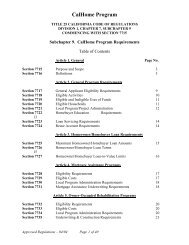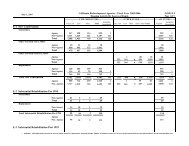Adobe PDF - California Department of Housing and Community ...
Adobe PDF - California Department of Housing and Community ...
Adobe PDF - California Department of Housing and Community ...
You also want an ePaper? Increase the reach of your titles
YUMPU automatically turns print PDFs into web optimized ePapers that Google loves.
PUBLIC REVENUES - REGULATIONS <br />
5. A golf course owned or leased by a golf club which owns or leases golf carts that it furnishes to persons for use<br />
in playing the course, or a golf course under the supervision <strong>and</strong> control <strong>of</strong> a golf pr<strong>of</strong>essional who owns or leases golf<br />
carts that he or she furnishes to persons for use in playing the course.<br />
(3) Examples <strong>of</strong> Situations Which Do Not Qualify for Exclusion from the Term “Lease.”<br />
(A) One <strong>of</strong> several rental firms permitted by a hospital to do so rents a portable television set <strong>and</strong> st<strong>and</strong> to a hospital<br />
patient for a charge <strong>of</strong> $4.00 per day for a period <strong>of</strong> six days.<br />
This situation does not qualify for the exclusion because the period <strong>of</strong> “use” is not for less than one day, the total rental is<br />
not less than $20 <strong>and</strong> the place <strong>of</strong> use is not the “premises” or “business location” <strong>of</strong> the rental firm since it does not<br />
have “exclusive right <strong>of</strong> use” <strong>of</strong> the hospital as regards the placing <strong>of</strong> its rental units therein nor is the space regularly occupied<br />
by it for use in place.<br />
(B) Rental <strong>of</strong> a canoe for a period <strong>of</strong> eight hours for a total charge <strong>of</strong> $4 when the customer will use the canoe on the<br />
Russian River.<br />
This situation does not qualify for the exclusion because the river is not the premises or business location <strong>of</strong> the grantor<br />
<strong>of</strong> the privilege.<br />
(C) Rental <strong>of</strong> tools to be used on the premises <strong>of</strong> the owner <strong>of</strong> the tools for a period <strong>of</strong> eight hours invoiced as<br />
follows:<br />
1 Portable lamp ........................... $ 4<br />
1 Wheel pulley ............................ 4<br />
1 Portable hoist ............................. 4<br />
1 S<strong>and</strong>er ..................................... 4<br />
1 Spray gun ................................ 5<br />
Total rental .................................. $21<br />
This situation does not qualify for the exclusion because the agreement for rental <strong>of</strong> the property is a single<br />
agreement involving rental charges <strong>of</strong> $21 <strong>and</strong> does not meet the requirement that the charge be less than $20.<br />
(D) An equipment rental firm rents a cement mixer to a customer who takes the mixer to his or her home <strong>and</strong> uses it<br />
for less than one day. The rental charge is $9. The mixer is <strong>of</strong> a type which must be firmly “in place” during the cement<br />
mixing operation.<br />
This situation does not qualify for the exclusion because although the mixer is firmly “in place” during the mixing<br />
operation, it is not in a space regularly occupied by it for use in place by customers <strong>of</strong> the grantor.<br />
(4) Application <strong>of</strong> Tax to Situations Qualifying for Exclusion from the Term “Lease.” The grantor <strong>of</strong> the privilege to<br />
use property under the conditions described in (e)(1) above is the consumer <strong>of</strong> the property. Accordingly, charges by him<br />
or her for the privilege to use the property are not subject to tax. Tax applies to the sale <strong>of</strong> the property to him or her by a<br />
retailer or to his or her use <strong>of</strong> the property, measured by his or her purchase price, when the property is purchased from a<br />
retailer in <strong>California</strong> under a resale certificate or from a retailer at an out-<strong>of</strong>-state location. If the property is acquired through<br />
an “occasional sale” as defined in section 6006.5 <strong>of</strong> the Revenue <strong>and</strong> Taxation Code, or other exempt transaction, no tax<br />
applies to the acquisition or use <strong>of</strong> the property by the grantor nor to his or her charges for the privilege to use the<br />
property.<br />
§ 1699. Permits<br />
(a) In General–Number <strong>of</strong> Permits Required. Every person engaged in the business <strong>of</strong> selling (or leasing under a<br />
lease defined as a sale in Revenue <strong>and</strong> Taxation Code section 6006(g)) tangible personal property <strong>of</strong> a kind the gross<br />
receipts from the retail sale <strong>of</strong> which are required to be included in the measure <strong>of</strong> the sales tax, <strong>and</strong> only a person<br />
actively so engaged, is required to hold a permit for each place <strong>of</strong> business in this state at which transactions relating to<br />
sales are customarily negotiated with his or her customers. For example:<br />
A permit is required for a branch sales <strong>of</strong>fice at which orders are customarily taken <strong>and</strong> contracts negotiated,<br />
whether or not merch<strong>and</strong>ise is stocked there.<br />
No additional permits are required for warehouses or other places at which merch<strong>and</strong>ise is merely stored <strong>and</strong> which<br />
customers do not customarily visit for the purpose <strong>of</strong> making purchases <strong>and</strong> which are maintained in conjunction with a<br />
place <strong>of</strong> business for which a permit is held; but at least one permit must be held by every person maintaining stocks <strong>of</strong><br />
merch<strong>and</strong>ise in this state for sale.<br />
If two or more activities are conducted by the same person on the same premises, even though in different buildings,<br />
only one permit is required. For example:<br />
A service station operator having a restaurant in addition to the station on the same premises requires only one permit<br />
for both activities.<br />
(b) Persons Selling in Interstate Commerce or to United States Government. A permit is not required to be held by<br />
persons all <strong>of</strong> whose sales are made exclusively in interstate or foreign commerce but a permit is required <strong>of</strong><br />
persons notwithst<strong>and</strong>ing all their sales (or leases under a lease defined as a sale in Revenue <strong>and</strong> Taxation Code<br />
section 6006(g)) are made to the United States or instrumentalities there<strong>of</strong>.<br />
(c) Persons Selling Feed. Effective April 1, 1996, a permit is not required to be held by persons whose sales<br />
consist entirely <strong>of</strong> sales <strong>of</strong> feed for any form <strong>of</strong> animal life <strong>of</strong> a kind the products <strong>of</strong> which ordinarily constitute food for<br />
human consumption (food animals), or for any form <strong>of</strong> animal life not <strong>of</strong> such a kind (nonfood animals) which are<br />
being held for sale in the regular course <strong>of</strong> business, provided no other retail sales <strong>of</strong> tangible personal property are made.<br />
167



